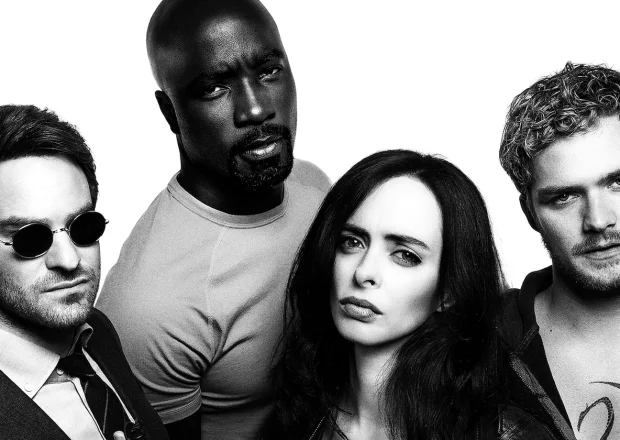TV REVIEW: "Love" - Season 2
She's a recovering alcoholic/love/sex addict, he's a co-dependent with boundary issues. They are Mickey and Gus, two dysfunctional thirty-somethings, played by Gillian Jacobs and Love co-creator Paul Rust, respectively.
Love charts their meet-cute that blossoms into a troubled, potentially radioactive courtship, with season one ending (after episode upon episode of tumult and mixed-signals) at the gas station where they first met and sharing a passionate kiss. It was a strange note to end on, as Mickey just told Gus that she needed a break from him in order to focus on herself. So that ending was supposed to be, what, romantic? It was difficult to know exactly what the intention was, especially for a series that has one foot in the real world and the other in rom-com fairy land. How season 2 was going to proceed from there would settle once and for all the question of whether Love was about something more than a Manic Pixie wank off.
So unsurprisingly, Season 2 begins from that confusing moment, with Mickey pulling away from Gus with a “What did I just tell you?!” kind of anger and confusion. Love is aware of both the traumatic and gently funny pratfalls of getting close to someone, and won't shy away from it.
In fact that's the show's lifeblood: nerve-wracking awkwardness and well-intentioned romantic gestures that come off as manipulative and pathetic. That and the chaotic fluxes of Mickey and Gus' dynamic, which is always fascinating and, against all odds, charming, even when it's not unlike the helpless horror of watching a car pile-up. Jacobs and Rust are appealing leads who share a palpable chemistry that visibly enlivens them and seems to serve as an anaesthetic that dulls the pain in their lives. It's a powerful thing.
But it can be too powerful. Inevitably, in their volatile hands, that chemistry blows up in their faces, leaving them as depressive wrecks who far too easily retreat into their most destructive habits. You only hope that they find each other again because together is when they seem happiest. But then you remember they're actually quite terrible for each other. It's challenging stuff.
Paul Rust as Gus continues to do fine work here as the meek dude whose 'Nice Guy' armour easily cracks under pressure. And so when the dark passive-aggression leaks out during inappropriate moments, it's hilarious and uncomfortably relatable -- think millennial George Costanza and you're about halfway there. But Love continues to be the Gillian Jacobs show. She's a revelation as Mickey, someone who both bares their scars and vulnerability all too easily, yet is also a cruel, snobbish hipster. You probably would never want to meet her, but she's interesting and complex enough to sustain several seasons of television.
What makes this show so binge-able (and therefore right at home on Netflix) is that episodes usually focus on specific events. Although a few disparate plot-threads culminate in the season finale, each episode feels like a self-contained short indie film. For instance, episode 5 “Shrooms” focuses on Mickey, Gus, Mickey's roommate Bertie (Claudia O'Doherty, wonderful) and her boyfriend Randy (Mike Mitchell, somehow terrifying and huggable), taking mushrooms and the episode follows their trip.
In most television shows, this would be a plot device, a wacky avenue for a character to have an epiphany necessary to move their story forward. Not so here. It's just kind of funny and weird and you're happy to just watch as whatever unfurls. One is affected by the shrooms far more than the others. Some shenanigans ensue and then they go to bed. Before going to sleep, someone casually mumbles something horrifying and you wonder if it'll lead anywhere or whether it's mostly just drug talk.
You actually wonder quite a bit as you watch Love; even the side characters are vividly realised, complete with their own needs and desires. No one feels like a cliché and nothing plays out quite like you expect, which is quite impressive for a show centred on the way too familiar premise of disaffected LA people and their crappy professional and personal lives.
So Love is light on plot, sure, but it's huge on character and personality. Its meandering vibe approximates the characters' mindsets; these people haven't a clue about what they're doing with their lives and sometimes sharply feel the edges of panic that maybe all the choices they made were wrong. The LA setting seems to be of piece with the meandering vibe. It's filmed here as just one long stretch of road marked by a never-ending series of fast food joints, classy restaurants, movie theatres, and gas stations.
Of course, it being set in Los Angeles, one character equates his station in life with a movie, specifically Jurassic Park. “It's like, I'm thirty minutes into Jurassic Park and the dinosaurs still haven't shown up. When are the dinosaurs gonna show up for me?”. It's a great metaphor for Love, too; the veritable dinosaurs -- fulfilment, stability, general happiness -- may never show up in Love, either, and that makes it one of the realest and most compelling Netflix originals.






